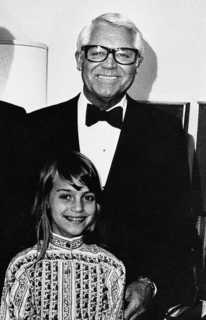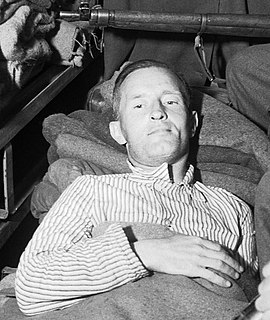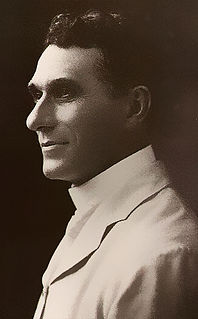A Quote by Marcel Proust
There is no man, however wise, who has not at some period of his youth said things, or lived in a way the consciousness of which is so unpleasant to him in later life that he would gladly, if he could, expunge it from his memory.
Related Quotes
There is no man ... however wise, who has not at some period of his youth said things, or lived a life, the memory of which is so unpleasant to him that he would gladly expunge it. And yet he ought not entirely to regret it, because he cannot be certain that he has indeed become a wise man -- so far as it is possible for any of us to be wise -- unless he has passed through all the fatuous or unwholesome incarnations by which that ultimate stage must be preceded.
Man is a spiritual being, a soul, and at some period of his life everyone is possessed with an irresistible desire to know his relationship to the Infinite. . . . There is something within him which urges him to rise above himself, to control his environment, to master the body and all things physical and live in a higher and more beautiful world.
With the supplies gathered, he went over to the stainless-steel sink and pressed the foot pedal to get the water running. While he washed his hands, he said quietly, "If I could, I would." "Excuse me?" Qhuinn pumped some suds into his palms and scrubbed all the way up his forearms. Which was overkill, but if Blay wanted him superclean, then that was what he was going to be. "If I could love a guy like that, it would be you.
What the working man sells is not directly his Labor, but his Laboring Power, the temporary disposal of which he makes over to the capitalist. This is so much the case that I do not know whether by the English Law, but certainly by some Continental Laws, the maximum time is fixed for which a man is allowed to sell his laboring power. If allowed to do so for any indefinite period whatever, slavery would be immediately restored. Such a sale, if it comprised his lifetime, for example, would make him at once the lifelong slave of his employer.
The realm of death seems an enemy's country to most men, on whose shores they are loathly driven by stress of weather; to the wise man it is the desired port where he moors his bark gladly, as in some quiet haven of the Fortunate Isles; it is the golden west into which his sun sinks, and, sinking, casts back a glory upon the leaden cloud-tack which had darkly besieged his day.
Ideas are powerful things, requiring not a studious contemplation but an action, even if it is only an inner action. Their acquisition obligates each man in some way to change his life, even if it is only his inner life. They demand to be stood for. They dictate where a man must concentrate his vision. They determine his moral and intellectual priorities. They provide him with allies and make him enemies. In short, ideas impose an interest in their ultimate fate which goes far beyond the realm of the merely reasonable.
When a man sought knowledge, it would not be long before it could be seen in his humbleness, his sight, upon his tongue and his hands, in his prayer, in his speech and in his disinterest (zuhd) in worldly allurements. And a man would acquire a portion of knowledge and put it into practice, and it would be better for him than the world and all it contains - if he owned it he would give it in exchange for the hereafter.
I would gladly say 'Heil Hitler!' and at once part company with him, realizing what a pitiable insult it is to such a great man to try to flatter him with such an imitation which he has always disdained. His way is for Germany, ours is for Britain; let us tread our paths with mutual respect, which is rarely increased by borrowing.
The word which is best said came nearest to not being spoken at all, for it is cousin to a deed which the speaker could have better done. Nay, almost it must have taken the place of a deed by some urgent necessity, even by some misfortune, so that the truest writer will be some captive knight, after all. And perhaps the fates had such a design, when, having stored Raleigh so richly with the substance of life and experience, they made him a fast prisoner, and compelled him to make his words his deeds, and transfer to his expression the emphasis and sincerity of his action.
A father would do well, as his son grows up, and is capable of it, to talk familiarly with him; nay, ask his advice, and consult with him about those things wherein he has any knowledge or understanding. By this, the father will gain two things, both of great moment. The sooner you treat him as a man, the sooner he will begin to be one; and if you admit him into serious discourses sometimes with you, you will insensibly raise his mind above the usual amusements of youth, and those trifling occupations which it is commonly wasted in.
The thing that was forfeited in the garden was regained. God gave him [Adam] dominion over the works of His hand. God made him His understudy, His king to rule over everything that had life. Man was master, man lived in the realm of god. He lived on terms of equality with God. God was a faith God. All God had to do was to believe that the sun was, and the sun was. All God had to do was to believe that the planets would be, and they were. Man belonged to God's class of being - a faith man, And he lived in the creative realm of God
It is an absolutely vain endeavor to attempt to reconstruct or even comprehend the nature of a human being by simply knowing the forces which have acted upon him. However deeply we should like to penetrate, however close we seem to be drawing to truth, one unknown quantity eludes us: man's primordial energy, his original self, that personality which was given him with the gift of life itself. On it rests man's true freedom; it alone determines his real character.






































